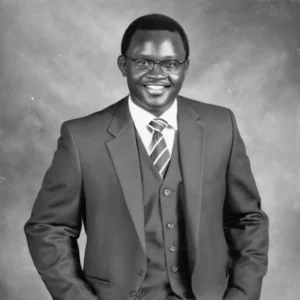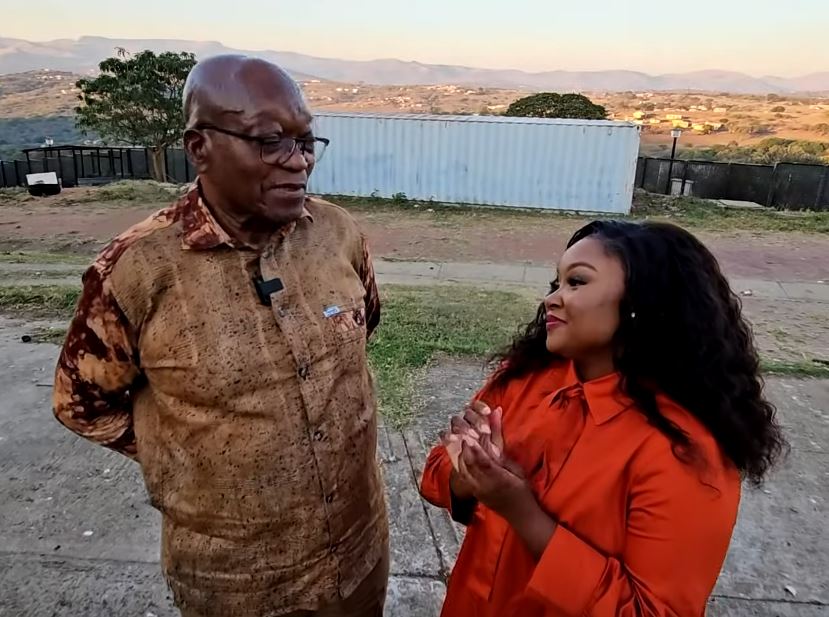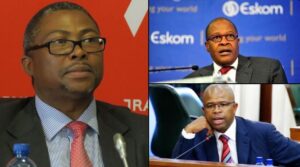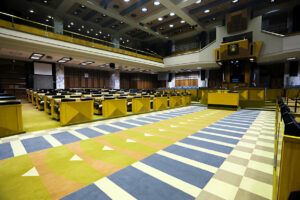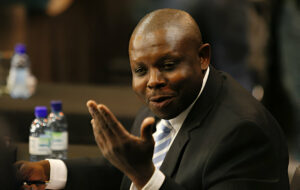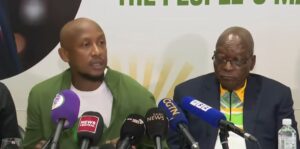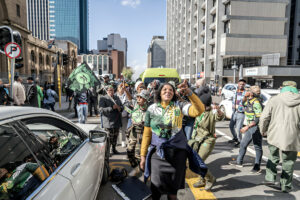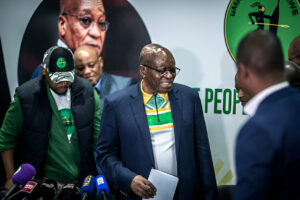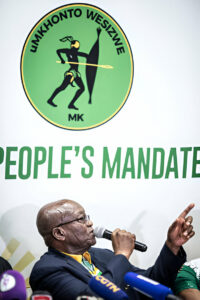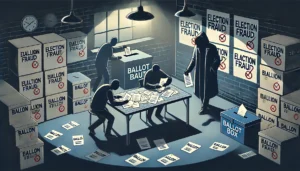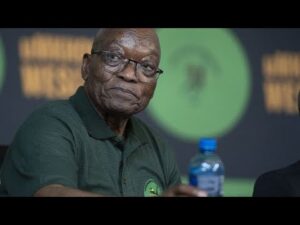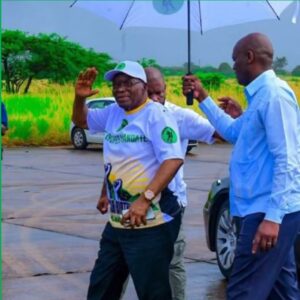Ziyanda Ngcobo sits down with former President Jacob Zuma at his Nkandla homestead to discuss his journey from being an ANC member to leading the newly established UmKhonto We Size party. Spending an afternoon with the ex-president, we delve into a variety of topics, including the goals of his MK party, his arrest in 2021, and his future as an 82-year-old politician in South Africa. Let’s start with his life post-presidency.
Full One on One Jacob Interview
Zuma resigned on Valentine’s Day 2018 and has since faced numerous court battles, becoming the first democratically elected president in South Africa to be arrested. We ask him to share his thoughts on the Constitutional Court’s ruling that led to his imprisonment.
Reflections on Democracy
“Well, well, well, to be, firstly, I knew in terms of certain types of democracies, presidents have time. In other democracies, there is no time, as long as the people say he’s doing very well, it continues, and there’s no, that’s why I always say there are democracies and democracies.”
When prompted for clarification, Zuma elaborates on the different democratic systems, comparing those with fixed presidential terms to others where tenure is indefinite based on public approval. He highlights his experience with South Africa’s unique form of democracy, where prolonged legal battles are not uncommon.
“In a democracy, you can have 20 years of a case, one case that is not ending. That’s South African democracy.”
Commitment to Freedom
Zuma passionately identifies himself as a lifelong freedom fighter, emphasizing his dedication to combating injustice.
“I fight against anything that is unfair to other people. And I will do so. I did so when I was young. I will continue to do so.”
Recalling his involvement in the anti-apartheid struggle and subsequent political rise, he describes his role in the early negotiations that led to South Africa’s liberation. He speaks of his plea to Nelson Mandela to address the violence in KwaZulu-Natal during the transition period.
“I explained to him that even if you’re a president, if this violence appears in the TV globally, people will say, yes, Mandela is now the president, but his country is on fire.”
Zuma recounts his efforts to mitigate violence in the region, eventually becoming the provincial chairperson and later the national chairperson of the ANC. Despite his reluctance to hold prominent positions, he was eventually elected as deputy president and then president.
Presidential Tenure and Policies
Zuma reflects on the expected two-term presidential tenure and the surprise third-term bid by Thabo Mbeki, which he believes was not beneficial for the ANC.
“It was not. I knew that even then it was not.”
Discussing his presidency, Zuma highlights significant policy changes he implemented, such as addressing the HIV/AIDS crisis and expanding electricity access.
“When I came in, I took what scientists were saying and I said, this is what the death of people stopped.”
He also mentions his role in bringing South Africa into BRICS, aiming to reshape global political and economic landscapes.
Arrest and Imprisonment
Zuma shares his perspective on the corruption investigation and his contentious relationship with the judiciary. He firmly stands by his decision not to participate in the commission, citing concerns about fairness.
“I came there. I said the judge would not be fair to me. And I stated the reason.”
Describing the events leading to his arrest, Zuma expresses his dismay at the judiciary’s actions and the military’s involvement.
“They mobilized soldiers throughout the country to come and arrest this one man. Not even handling a stick of magic to burn one of the people. Just me.”
He recalls the unrest following his arrest and his decision to surrender to prevent potential bloodshed.
“Let me save the poor people. Innocent people. Let me not allow them to be killed. Let me go to prison.”
Zuma’s narrative reveals his enduring belief in fighting injustice and his complex relationship with South Africa’s evolving democracy. His reflections provide a window into his past struggles, current challenges, and unwavering commitment to his principles.
Complete Jacob Zuma Interview with Ziyanda Ngcobo
Ziyanda Ngcobo: We’re in conversation with former President Jacob Zuma at his Ngandla compound, where he’ll tell us about how he’s an ANC member but a leader of the newly formed UmKhonto We Size party. We’ve spent an afternoon with the former head of state, where we speak about a wide range of issues from the plans of this MK party, his arrest in 2021, and what he has to offer as an 82-year-old politician in South Africa. I don’t know, maybe you can tell me, but what I do want to know is what life has been like after the presidency.
I mean, you resigned on Valentine’s Day 2018, and since then you’ve been in and out of court, but most significant has been the fact that you are the first democratically elected president to be arrested. Just talk about that moment when you were, when the Constitutional Court ruled against you, and they said Jacob Zuma must go to prison.
Jacob Zuma: Well, well, well, to be, firstly, I knew in terms of certain types of democracies, presidents have time. In other democracies, there is no time, as long as the people say he’s doing very well, it continues, and there’s no, that’s why I always say there are democracies and democracies.
Ziyanda Ngcobo: What do you mean by that?
Jacob Zuma: I’ve just said it, that in some instances inside the democracy, there are specific years put, others, the majority is five, others about seven or eight, then you change, you take another one. In some countries, there is no such time where you are a president as long as people feel you are doing well. That’s why I’m saying, therefore, there are democracies and democracies.
Ziyanda Ngcobo: Okay.
Jacob Zuma: Yes. As you would see with me as well, on the last question you asked, as another democracy, that people can, in a democracy, you can have 20 years of a case, one case that is not ending. That’s South African democracy. I haven’t heard it anywhere else. So there are democracies and democracies, my dear. So me, when I was here, in the first instance, I am a freedom fighter. I still call myself a freedom fighter.
Ziyanda Ngcobo: Okay.
Jacob Zuma: Yes. Because I fight against anything that is unfair to other people. And I will do so. I did so when I was young. I will continue to do so. I will never, no matter whether you talk to the biggest person or the biggest country, I don’t give in on that one.
Ziyanda Ngcobo: Okay.
Jacob Zuma: And therefore, I never thought I would ever be a president. I’ll be a freedom fighter and liberate the people of South Africa. And I was very happy that I was at the heart of it. After joining and growing within the struggle, and indeed, finally, in part of participating at the point when South Africa was being freed. If you remember, the leadership in Lusaka sent me to come in and start what was called Talks About Talks. I led a small delegation to start that, which was the starting of the negotiations. And I was deep in it, as I’ve been deep all the time. I went to Robben Island, I did whatever. But finally, we succeeded to liberate the country after negotiations. And I was part of it. At that time, you’ll remember, there was very heavy violence, particularly in KZN, which was Natal then, and Johannesburg in particular. And I felt that kind of violence was not fair. And it was started by people secretly, and there are many secrets in the world. And I happened to know, because of the job I was doing, how that violence started. As we were negotiating and getting into the country to participate in the negotiations, as we won elections for the first time, I then pleaded with the president, my president then, Nelson Mandela, to allow me to come to this province of KZN to participate in stopping violence. Madiba wanted me to be one of the ministers. And he said, no, I want you in my team of the ministers. And I said to him, please, I plead. I don’t want to have got more than enough comrades. And nobody can stop that war, because I don’t think firstly people knew how it started, but also knew the behavior of the people who live in this province. Because if you don’t know them, you can’t stop them fighting, unless and until you know them. And I explained to him that even if you’re a president, if this violence appears in the TV globally, people will say, yes, Mandela is now the president, but his country is on fire, because that’s how it looked like. And fortunately, because he was a man who was too bright than many others and too above me, he realized and agreed that I should come. So I came back here. And I did not want to lead anything. I wanted to participate in stopping the violence. And that’s what I think I did to a large extent, of course, together with other colleagues and other people. But also, having done so, I was then elected here by comrades as the chairperson of the province, which was fine. But I did not want to be somewhere there. I wanted to work down there, because some of my training was down there. But finally, they also wanted me to be the national chairperson, and they actually forced me to be, and I became one. And thereafter, I was forced to be the deputy president of Thabo Mbeki when Mandela left. And of course, as you know, maybe I put it very well that I’m problematic all the time, because whilst I was a deputy president, I was also taken out of it by the president. But I remained the deputy president of the ANC. I was also pushed away from there at some point. But the ANC membership said no. So finally, when Thabo Mbeki left as a president, I became the president. I thought it was going to be smooth, but it was not smooth.
Ziyanda Ngcobo: What made you think it was going to be smooth?
Jacob Zuma: No, because you are given, in terms of what was discussed, two terms that you will have, and then thereafter, somebody would follow. That’s the two terms I was talking about. Comrade Thabo Mbeki had been a deputy during Madiba, and then he had these two. And we all believed that that was it. We actually used to say some leaders in the continent, if they wanted a third term, we said, no, no, no, that’s not. Everybody said two, two, two. But we ended up contesting one another, me and Mbeki.
Ziyanda Ngcobo: Do you think that was a good thing for the ANC?
Jacob Zuma: Absolutely not. It was not. I knew that even then it was not. But we in the ANC had not accepted that you can do a third term. It was a generally accepted thing. What was shocking was one of us saying, no, I want to have a third majority. That was what was shocking. The other one was a normal thing.
Ziyanda Ngcobo: Do you think it’s shocking now? Do you think it’s more acceptable now? No, no. Do you still stand by it?
Jacob Zuma: It’s still done that way. We have not said as an organization to say, let us now change this. We haven’t. Or as revolutionaries in South Africa, the matter is known as two terms. Yes. So it’s clear. Only at that time there was one interruption, which was corrected on the spot. Everything was straight. Now, then I became the president and I had, because in the struggle, I knew exactly what I was doing, what I needed. So when I became the president, I had that opportunity. I did everything to bring about change in this country. Number of things, and I don’t think that’s a time to be talking about it because it is a story of its own, but you know very well, I introduced policies that were not here.
Ziyanda Ngcobo: Like?
Jacob Zuma: You want me to count one, one, two, three, four. For example, in this country at that time, there was a sickness that was killing people, right? It was called, I’m sure you remember.
Ziyanda Ngcobo: HIV and AIDS.
Jacob Zuma: You remember what it was?
Ziyanda Ngcobo: Yes.
Jacob Zuma: What was it?
Ziyanda Ngcobo: HIV and AIDS. HIV and AIDS.
Jacob Zuma: HIV and AIDS. Okay. I want people there who must understand. So as you know, people were dying and we had policies. We had discussed what we need to do to stop this. But at that time, those in power were saying, no, they had a different view. So when I came in, I took what scientists were saying and I said, this is what the death of people stopped. And up to this day, people remind me that I stopped people from dying in South Africa, which we had a policy by the people who were feeling differently from it. I also did a number of other things. For example, I introduced things like drug development, which was not there before, which people, of course, did not understand properly, but it was also accepted that there was this to be done. We needed to develop our people. I declared that electricity must be everywhere in the country, not only in the cities. And people are saying, no, there’s a shortage of, I said, shortage or no shortage, we want it. And I came with a number of other things that came. I joined a group of countries that are five. They’ve got the name, we remember the name. What is the name?
Ziyanda Ngcobo: BRICS.
Jacob Zuma: BRICS. People think BRICS is a name of five countries, which is the group of the countries to change the world into a better way of life rather than what has been happening. Wherein countries who are not that strong, that grouping makes it move forward and change the political and economic things in the world. And that group, the South Africa, sorry, the South Africa to get into there was a big thing that has actually shaken the world.
Ziyanda Ngcobo: Do you still maintain that’s part of the reason why you’re no longer president?
Jacob Zuma: Not only that, but it is one that was the biggest scheme of the big global countries who conspired that I should move because I was too active. I was also in Africa, making Africa therefore to grow in a particular way. At that time when I was there, Africa for the first time discussed the infrastructure of the entire continent. We discussed many, many big things. And that’s why my enemies felt this man must move because there was no reason. I asked people who came to me to say, resign. What have I done? Nothing. Why? They told me their own story. So there were reasons why I had to be removed. And by then I said, okay, let me go to my place where I was born and gone.
Ziyanda Ngcobo: Which is where we are right now.
Jacob Zuma: Where we are right now. And I’ve been sitting here peacefully.
Ziyanda Ngcobo: Until you were arrested.
Jacob Zuma: Until I was arrested.
Ziyanda Ngcobo: Take me through the moment when I remember as a journalist, the judgment came and we were parked right outside here. Of course, there’s a lot of discussion. There’s a five-day deadline for Begida Ele to implement in executing your arrest. But the moment where Justice Sisi Kampembe is saying, you must go to jail. Where are you? What’s going through your mind?
Jacob Zuma: Well, I’ve been very clear all the time that there was a particular attitude towards me. Arising from different quarters, big and small. Some very big, some buying small ones to do their work of the big ones. For example, there was a point that there should be a commission that must investigate corruption. State capture, to be specific. Well, yes, that’s a name.
Ziyanda Ngcobo: I know you debate. I’ve never understood. Yes, we know the debate.
Jacob Zuma: I’ve never understood.
Ziyanda Ngcobo: There are three arms of the state. I know where you stand when it comes to that.
Jacob Zuma: It was also wrong. It remains wrong up to this day.
Ziyanda Ngcobo: Do you regret not going to that commission?
Jacob Zuma: No, I would have gone to the commission and tell what I wanted to say. I think some people did not want me to.
Ziyanda Ngcobo: Did not want you to go to the commission?
Jacob Zuma: Because I came there. I said the judge would not be fair to me. And I stated the reason. Therefore, I need somebody else to sit here so that I can talk to. But the judge said, no, I’m not. I’ve never heard of that. And then started writing his own statement, arguing with me on some matter that I’m saying, please move away. Bring somebody else.
Ziyanda Ngcobo: Do you regret that?
Jacob Zuma: No, I don’t regret. Because that was demonstrating the kind of democracy in South Africa. What type of democracy? In the first instance, if you have a commission, it is all known. Once you have a commission, you must have a deputy. It’s done everywhere. That judge did not have a person that if such a situation happens, will be there to come and take me and then you proceed. And he said, no, no, no, I’m not. Why? He said, no, no, no, I’m here. He actually wrote something to argue against me. It’s never done. It’s never done in law. It’s never done. You don’t sit there as a chair and say, I don’t want to move away. I want to try you. It’s never done. This is supposed to be a deputy judge. Number two of the whole thing going up there. Now, my lawyer asked him, just tell me why you decided to be the chair only without a deputy? Because this is a normal thing that you do.
Ziyanda Ngcobo: Yeah.
Jacob Zuma: He says, no, I do not want when I take decision that somebody must argue with me. Is that a democracy? Is that a legal place, legal in the country? So I said, I can’t. I can’t therefore sit with you. I can’t talk with you. What does he do? Under normal circumstances, he would then go through the processes that are necessary with the commission. And what do you do?
Ziyanda Ngcobo: Yeah.
Jacob Zuma: He straight away wrote a letter to the constitutional court and said in the letter, I’m charging Zuma. You must sentence him to yes. This is a judge sitting as a chairperson of a commission. He tells the judges who are at the constitutional court who report to him. So as a boss, he gives them instructions and they don’t use the legal, normal situation to say, sorry, you can’t say you must try a case. Those guys try issues that have not been agreed at lower levels. I’ve never had a fellow who stays up there sitting in a commission and instructing judges and they all agree. And in the process of that, in the first instance, this judge is doing the wrong thing. I know. I’m not a child. I fought for this freedom. I understand the democracy that I fought for. I can’t tell me more than that because I don’t remember him. In the fighting, when we were fighting for freedom. But let alone that, all I’m saying, you realize the problem that I have about some of the things. Why, for example, when I was never, never, never, never, there’s nothing that was found about me, about this home. This home was done by me and the sons of my brother. We did the payment of this, everything.
Ziyanda Ngcobo: All of it?
Jacob Zuma: All of it. I’m telling you what I’m telling you, unless you know there is something else.
Ziyanda Ngcobo: Okay.
Jacob Zuma: Because only things that government had to do to a person at the position of that in the country.
Ziyanda Ngcobo: Yeah.
Jacob Zuma: Therefore, they will come in to deal with that one. But I was told the monies were said so much and so much, but nobody has ever said here where Zuma gets the money, here where he put it, etc.
Ziyanda Ngcobo: Okay, but I want us to move beyond that.
Jacob Zuma: No, I’m moving beyond. I’m just telling you about this home that we are talking about, that we are walking in.
Ziyanda Ngcobo: Yes.
Jacob Zuma: That people have been saying things about.
Ziyanda Ngcobo: Yeah.
Jacob Zuma: Okay? Okay. To say that, therefore, the judges, the judges said, took the instruction from the judge and charged me.
Ziyanda Ngcobo: Yeah.
Jacob Zuma: First of its own in the country. They are not there to deal with cases.
Ziyanda Ngcobo: Of the commission, the summons that were issued.
Jacob Zuma: Exactly, if we take it, it should have been taken to a court, to a judge to deal with me, not the constitutional court.
Ziyanda Ngcobo: Okay.
Jacob Zuma: What was constitutional about that? There was nothing constitutional. It was just a question of me and him not agreeing. And if that happens, it must be taken to, whether it’s magistrate or the judge, not constitutional court. There was no constitutional issue that was out of the way. It wasn’t. I said to him, and this is very true, you can’t talk to me about this matter. I plead that to move aside, keep somebody else to talk to. Is that a constitutional issue? To be a case in the constitution? I don’t think so. If that is the case, then the South African democracy is something else. And they’ve been proving it bit by bit that, indeed, some of these things just talk. It’s not reality. Because they took an instruction from a judge of a commission, not even of a court, of a commission, and all they did was to lessen the judgment. Instead of two years, it was 15 months. And when the judges, when they were saying I should come to court, I said, I’m not coming. That is my right.
Ziyanda Ngcobo: It’s your right not to go to court.
Jacob Zuma: To the court for what? For judges who are being instructed by those who are only judging the commission. Because they are judges. I don’t believe that. The judges must respect the law. Firstly, Judge Zondo should have respected what I was saying. They should have said to Zondo, we are wrong. Why should I go in because they are judges? I’m a citizen of this country. I’m not a fake. I’m a citizen of this country who also fought for the liberation of this country. Who died, who stayed in prison for 10 years for that freedom, for that democracy. And you can’t come and tell me when some of them did not even give a piece to fight for that freedom. So I will never do it. I, you know, for me to be a revolutionary was not a fake, was not halfway, was a total thing. I was ready to die then by the enemy that I disagreed with. So I couldn’t say to a judge because he’s a judge and start saying, no, I’m coming. No. They then end up sentencing me, having not even tried me. Because there might have been other ways. They might have either other judges who say, go and deal with this case. They just decided everything. And the judge who was pronouncing said, yes, we are taking this right out of Zuma because we are Telela. This is silly. We are therefore putting a right which is not theirs to decide that I must go to jail. That’s not democracy. For me, that’s not the democracy I fought in this country. I know what democracy means. That’s then is what led to me being now arrested.
Ziyanda Ngcobo: So when the judgment was handed down, you were angry?
Jacob Zuma: Of course. Yes, of course.
Ziyanda Ngcobo: Were you here? Where were you? You were here?
Jacob Zuma: I was here in this house of my family.
Ziyanda Ngcobo: Were you watching it live on television?
Jacob Zuma: Yes, I did. That’s why I saw who was talking. The lady. The lady, just this lady. Whether it’s Kampembe or whatever, but that was the lady. And I was shocked for that matter. A woman in a democratic South Africa, so angry against the person who is being victimized. That was saying to me, there’s still a long way to go. So I said, OK, I’m not going there. They said, no.
Ziyanda Ngcobo: So you’re not going there, as in to prison? When they said the judgment…
Jacob Zuma: Wherever, wherever, yeah. Why should I?
Ziyanda Ngcobo: You refused? Who did you tell?
Jacob Zuma: Absolutely.
Ziyanda Ngcobo: Said, I’m not going to prison?
Jacob Zuma: I said so. Yeah? I actually wrote a statement. I said, I’m not coming. I said, if you want to arrest me, you arrest me. I’m not coming. But this thing is wrong. And indeed, they were arresting me. And I said, I’m not going. I’m not going to court. I’m not going to prison either.
Ziyanda Ngcobo: But you ended up going.
Jacob Zuma: Of course, yes.
Ziyanda Ngcobo: That’s how, that’s what happened. At the last minute.
Jacob Zuma: That’s what happens when you deal with people who are oppressors of other people. You always get to jail. I ended up on Robben Island. It was not the first time. I was repeating it. What was even worse for me, they mobilized soldiers throughout the country to come and arrest this one man. Not even handling a stick of magic to burn one of the people. Just me. And people were angry of this country. Yeah. Very angry. They came here to say they must come and defend me.
Ziyanda Ngcobo: I remember that.
Jacob Zuma: Yes.
Ziyanda Ngcobo: Quite tumultuous outside the gates.
Jacob Zuma: Absolutely.
Ziyanda Ngcobo: I remember. And we know what happened even when you were arrested. The civil unrest.
Jacob Zuma: Absolutely. Because when they brought the police, it was all over. And people were here to say, you can’t take him. We could have had another massacre here. It was actually imminent. And government wanted it. Because I, in the afternoon at about, I think about three, I phoned the commissioner. And asked him. No, before that.
Ziyanda Ngcobo: National.
Jacob Zuma: National.
Ziyanda Ngcobo: Okay.
Jacob Zuma: I asked, why are you sending the army to arrest me? Because if you wanted to arrest me, you would have brought the police to come and arrest me. Why this? Because it was something. To arrest one little man. With the whole army. I said, but what is this? And I realized that there was a plan. In my own guess. To kill people here.
Ziyanda Ngcobo: To achieve what exactly?
Jacob Zuma: To achieve the fact that we’ve dealt with one terrorist. Because I was the first to be killed. I know the information. So I said, okay. Let me save the poor people. Innocent people. Let me not allow them to be killed. Let me go to prison.
